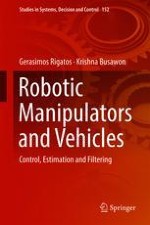2018 | OriginalPaper | Buchkapitel
11. Autonomous Underwater Vessels
verfasst von : Gerasimos Rigatos, Krishna Busawon
Erschienen in: Robotic Manipulators and Vehicles
Aktivieren Sie unsere intelligente Suche, um passende Fachinhalte oder Patente zu finden.
Wählen Sie Textabschnitte aus um mit Künstlicher Intelligenz passenden Patente zu finden. powered by
Markieren Sie Textabschnitte, um KI-gestützt weitere passende Inhalte zu finden. powered by
